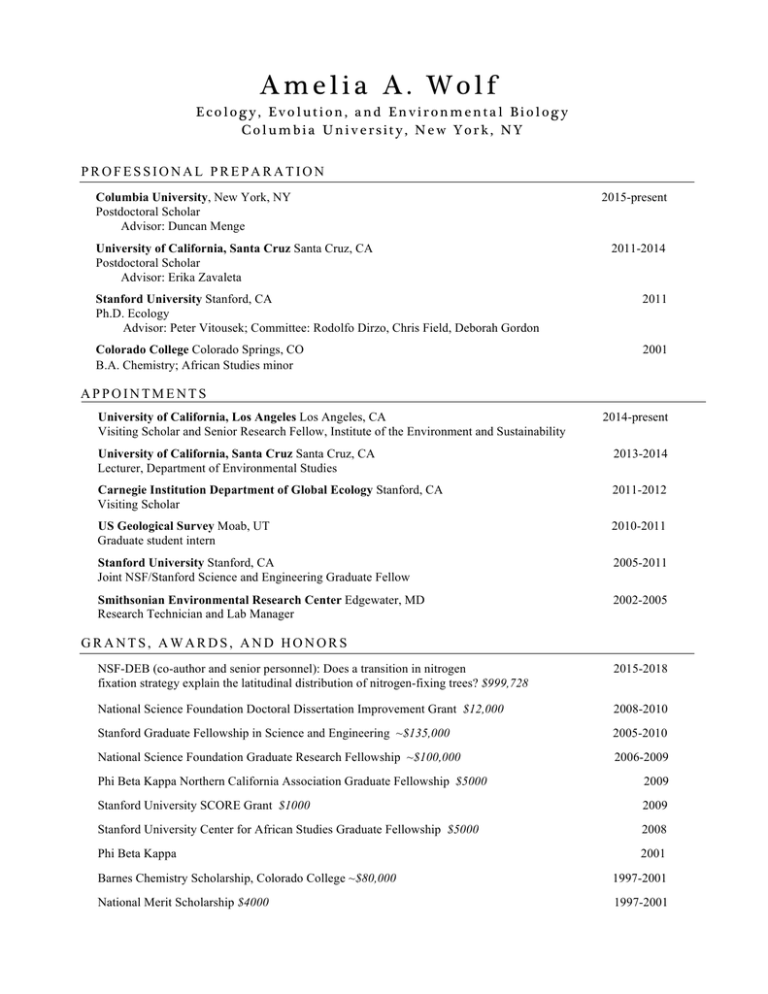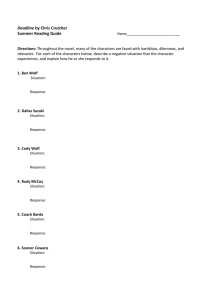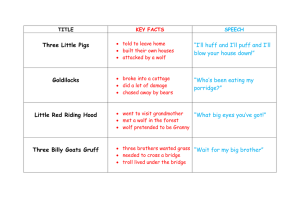CV - Columbia University
advertisement

Amelia A. Wolf Ecology, Evolution, and Environmental Biology Columbia University, New York, NY PROFESSIONAL PREPARATION Columbia University, New York, NY Postdoctoral Scholar Advisor: Duncan Menge University of California, Santa Cruz Santa Cruz, CA Postdoctoral Scholar Advisor: Erika Zavaleta 2015-present 2011-2014 Stanford University Stanford, CA Ph.D. Ecology Advisor: Peter Vitousek; Committee: Rodolfo Dirzo, Chris Field, Deborah Gordon 2011 Colorado College Colorado Springs, CO B.A. Chemistry; African Studies minor 2001 APPOINTMENTS University of California, Los Angeles Los Angeles, CA Visiting Scholar and Senior Research Fellow, Institute of the Environment and Sustainability 2014-present University of California, Santa Cruz Santa Cruz, CA Lecturer, Department of Environmental Studies 2013-2014 Carnegie Institution Department of Global Ecology Stanford, CA Visiting Scholar 2011-2012 US Geological Survey Moab, UT Graduate student intern 2010-2011 Stanford University Stanford, CA Joint NSF/Stanford Science and Engineering Graduate Fellow 2005-2011 Smithsonian Environmental Research Center Edgewater, MD Research Technician and Lab Manager 2002-2005 GRANTS, AWARDS, AND HONORS NSF-DEB (co-author and senior personnel): Does a transition in nitrogen fixation strategy explain the latitudinal distribution of nitrogen-fixing trees? $999,728 2015-2018 National Science Foundation Doctoral Dissertation Improvement Grant $12,000 2008-2010 Stanford Graduate Fellowship in Science and Engineering ~$135,000 2005-2010 National Science Foundation Graduate Research Fellowship ~$100,000 2006-2009 Phi Beta Kappa Northern California Association Graduate Fellowship $5000 2009 Stanford University SCORE Grant $1000 2009 Stanford University Center for African Studies Graduate Fellowship $5000 2008 Phi Beta Kappa 2001 Barnes Chemistry Scholarship, Colorado College ~$80,000 1997-2001 National Merit Scholarship $4000 1997-2001 Amelia A. Wolf PUBLICATIONS 10. Wolf, A.A., E.S. Zavaleta, P.C. Selmants, D. Hernandez, J. Pasari (revised and resubmitted to PNAS). Temporal and spatial variability in resource availability mediate the effects of realistic species loss on ecosystem functioning. 9. Menge, D.N.L., A.A. Wolf, J.L Funk (in review at Nature Plants). Diverse nitrogen fixation strategies and their ecosystem effects in natural systems. 8. Sistla, S.A., A.P. Appling, A.M. Lewandowska, B.N. Taylor, A.A. Wolf (in press). Stoichiometric plasticity in response to fertilization along gradients of environmental and organismal nutrient richness. Oikos. 7. Zavaleta, E.S., E. Olimpi, A.A. Wolf, B. Stanford, J. Pasari, S. Skikne, P. Quadri, K. Ennis, F. Stoike (in press). Biological invasions. in E.S. Zavaleta and H. Mooney (eds.) Ecosystems of California. University of California Press. 6. Wolf, A.A. and E.S. Zavaleta. 2015. Species traits outweigh nested structure in driving the effects of realistic biodiversity losses on productivity. Ecology. 5. Selmants, P.C., E.S. Zavaleta, A.A. Wolf. 2014. Realistic plant species losses alter community-level plant nitrogen use in a California serpentine grassland. Ecology. 4. Keller, J.K., A.A. Wolf, P.B. Weisenhorn, B.G. Drake, J.P. Megonigal. 2009. Elevated CO2 affects porewater chemistry in a brackish marsh. Biogeochemistry. 3. Langley, J.A., D.C. McKinley, A.A. Wolf, B.A. Hungate, B.G. Drake, J.P. Megonigal. 2009. Priming depletes soil carbon and releases nitrogen in a scrub-oak ecosystem exposed to elevated CO2. Soil Biology and Biochemistry. 2. Wolf, A.A., B.G. Drake, J.E. Erickson, J.P. Megonigal. 2007. An oxygen-mediated positive feedback between elevated carbon dioxide and soil organic matter decomposition in a simulated anaerobic wetland. Global Change Biology. 1. Megonigal, J.P., C.D. Vann, A.A. Wolf. 2005. Flooding constraints on tree and herb growth responses to elevated CO2. Wetlands. TEACHING EXPERIENCE University of California, Santa Cruz 2014 Winter quarter Instructor – Global Change Ecology (5 units) 2013 Summer quarter Instructor – Environmental Field Methods (5 units) 2013 Summer quarter Instructor – Field Methods Laboratory (2 units) 2013 Spring quarter Guest lecturer - Environmental Field Methods Stanford University 2012 Fall quarter Guest lecturer – Ecology 2010 Fall quarter Guest lecturer – Ecology 2007 Winter quarter Guest lecturer – Biology of Global Change 2007 Winter quarter Teaching assistant– Biology of Global Change 2006 Spring quarter Teaching assistant and section leader – Experimental Laboratory in Ecology 2006 Winter quarter Guest lecturer – Biology of Global Change 2006 Winter quarter Teaching assistant– Biology of Global Change Lecture: Direct effects of elevated CO2 on terrestrial ecosystems 2 Amelia A. Wolf SELECTED PRESENTATIONS Wolf, A.A., E.S. Zavaleta, P. Selmants, C.Morozumi, D. Hernandez, J. Pasari. 2014. Climatic variability and soil depth mediate the effects of biodiversity loss on ecosystem functioning. Annual meeting of the Ecological Society of America, Sacramento, CA. Wolf, A.A. 2014. Beyond protection: ant-plant mutualisms and resource distribution in an African savanna. Invited seminar, Chapman University, Orange, CA. Wolf, A.A., E.S. Zavaleta. 2012. Species traits, not nested structure, drive the effects of realistic biodiversity losses on productivity. Annual meeting of the Ecological Society of America, Portland, OR. Highlighted in Marc Cadotte’s EEB and Flow blog: http://evol-eco.blogspot.com/2012/08/esa-portlandday-2-march-of-phylogeny.html Wolf, A.A. 2011. Species interactions and resource distribution. Invited seminar, UC-Santa Cruz Department of Environmental Studies, Santa Cruz, CA. Wolf, A.A., S.C. Reed. 2011. Biofuel production potential in the southwestern U.S. Annual meeting of the Ecological Society of America, Austin, TX. Press coverage: Interviewed about this work for EarthSky, http://earthsky.org/human-world/biofuelproduction-has-potential-in-u-s-southwest Wolf, A.A., J.P. Megonigal, B.G. Drake. 2010. An oxygen-mediated positive feedback between elevated carbon dioxide and soil organic matter decomposition in a simulated anaerobic wetland. Invited seminar, Smithsonian Environmental Research Center, Edgewater, MD. Wolf, A.A., T.M. Palmer, P.M. Vitousek. 2009. Divergent effects of different ant partners on host trees in a Kenyan ant-plant mutualism. Annual meeting of the Ecological Society of America, Albuquerque, NM. Wolf, A.A. 2009. Does herbivore extirpation affect ant-mediated nutrient and water distribution in a Kenyan savanna? Bay Area Conservation Biology Symposium, Stanford, CA. Wolf, A.A. 2009. From the battlefront to the mess hall: assessing the impacts of ants on their host trees in a Kenyan savanna. Invited seminar, Stanford University Center for African Studies, Stanford, CA. Wolf, A.A. 2007. Host-tree nutrient provisioning by ants in a protective ant-Acacia mutualism. Species Interaction Workshop, Stanford, CA. Wolf, A.A., K.M. Carney, B.G. Drake, J.P. Megonigal. 2004. The priming effect: Elevated CO2 and rhizosphere presence increase soil organic matter decomposition in a wetland system. Annual meeting of the Ecological Society of America, Portland, OR. Wolf, A.A., J.P. Megonigal, B.A. Hungate, F.P. Day, B.G. Drake. 2003. Effects of elevated CO2 on soil carbon in a scrub oak ecosystem. Annual meeting of the Ecological Society of America, Savannah, GA. INVITED SYMPOSIA AND WORKSHOP PARTICIPANT Woodstoich: workshop on ecological stoichiometry. Selected participant. National Science Foundation and the University of Sydney, Sydney, Australia. August 2014. Workshop on Scientific Teaching. Selected participant. San Francisco State University, San Francisco, CA. February 2014. WEBS: Women Evolving Biological Sciences National Symposium. Selected participant. NESCent, Durham, North Carolina. October 2013. Ecological Norms Workshop: the future of biofuels and genetically engineered crops. Invited moderator. Stanford University. October 2011. 3 Amelia A. Wolf A quarter-century of CO2 enrichment in scrub oak and coastal wetland habitats. Invited workshop participant. Smithsonian Environmental Research Center, Edgewater, Maryland. May 2010. PROFESSIONAL SERVICE AND ACTIVITIES Ad-hoc reviewer, Proceedings of the Royal Society – B, PLoS One, Journal of Ecology, Global Change Biology, Ecosystems, The Geographic Journal, Australian Journal of Zoology. Co-founder, co-editor and contributor, Mpala Memos, a quarterly publication that seeks to inform a general audience of the scientific and outreach activities of Mpala Research Centre, Kenya, 2009-2012. Past issues can be found at: http://www.mpala.org/Get_our_Newsletter.php Instructor and Volunteer, Stanford SPLASH program for middle- and high-school students (2009-2011) Course taught: Ecology of the African Savanna Undergraduate mentor: two NSF-funded REU students in biogeochemistry at the Smithsonian Environmental Research Center (2003-2004); four Stanford University work-study students (2010-2011); 13 UC-Santa Cruz undergraduate field and laboratory assistants (2011-2013). Consultant with the Sustainable Food Lab on a web-based tool to quantify and provide direction on reductions of field-level agricultural greenhouse gas emissions, with specific work on N2O and soil carbon components, 2011-2012. Judge, Ecological Society of America ecophysiology section student and postdoctoral awards, 2011. Co-author, small-grants project leader, and proposal reviewer for the Stanford Department of Biology SCORE grant, 2008-2009. Inaugural steering-committee member, Central California Coast chapter of the Society for Conservation Biology, 2007-2008. Admissions committee graduate student member, Stanford University Department of Biology, 2007. 4

